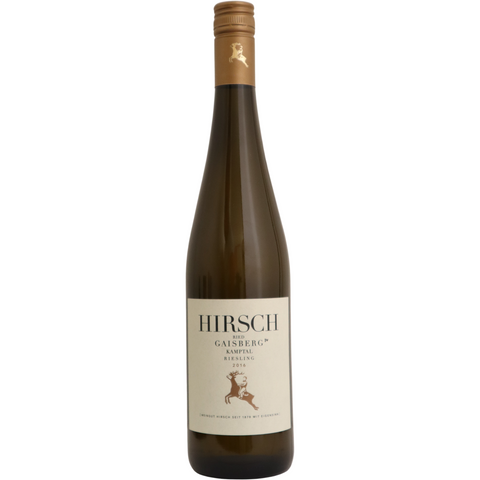
2016 Weingut Hirsch "Gaisberg" Riesling, Kamptal, Austria
In the glass, the wine glimmers and shines with aromas of peach, a medley of citrus highlighted by delicate floral notes. The palate is electric and richly fruited yet delightfully delicate. Sustained finish paired with mouthwatering salinity.
ABOUT THIS WINE
Many Kamptal aficionados see the Gaisberg as something of a ‘little brother’ to the famous Heiligenstein. However, this assessment does not do justice to the potential of the vineyard. Weathered mica schist covered with brown earth provides a nearly perfect soil for growing mineral-driven Rieslings. Situated near the village of Strass, the Gaisberg is the southeasternmost foothill of the Manhartsberg, still manifesting the crystalline material of the Bohemian Massif. The grapes for this wine are grown on terraces and come from vines that are some forty years of age.
Hirsch takes full advantage of the distinct terroirs found in the Lamm, Gaisberg and Heiligenstein vineyards. Johannes farms his vineyards sustainably and biodynamically and is certified by RESPEKT! Natural efforts have been made to ensure physiologically ripe grapes including high density planting, low trellising, canopy management and handpicking.
ABOUT THIS PRODUCER
If wines reflect the winemaker, Johannes Hirsch’s collection of Rieslings and Grüner Veltliners are full of energy and vitality. In the 1970s, ‘Hannes’ father started organic farming and in 2006, he was one of the founding members of Respekt – a new biodynamic certification started as an alternative to Demeter, which was then the only certification. Respekt has branched out from Austria and now covers “German speaking areas” including Northern Italy and Germany. Respekt is an independent organization and takes a holistic view to Biodynamics; the charter that members sign onto is a set of criteria which is certified twice per year by Lacon – it is not a “certification by way of an honor system” as some naysayers have suggested.
In the vineyard Hirsch uses biodynamic preparations and follows the lunar cycle for vineyard work. Eighty five percent of his holdings are in the slopes in the villages of Zöbing and Kammern, home to the Heiligenstein and Gaisberg Riesling vineyards as well as Lamm, Grub, Renner and Kammerner Gaisberg for Grüner Veltliner, though he is quick to note that “the grape variety is just a way to transport terroir. One hundred years ago, you might just find the village name on the label or the vineyard and no mention of the variety; it was not so important.” A full two thirds of his holdings are in classified, Erste Lagen vineyards.
In addition to bio-dynamic practices, Hirsch utilizes soft pruning, a method he learned in Alto Adige to minimize the amount of cuts and thus lessening the amount of tissue exposed to disease and old wood near the pruned area. In the vineyards, manure from celebrated cheese maker Robert Paget’s water buffalo and goats, grazing in the pastures in front of the vineyards, are used.
At harvest, a rigorous selection is made in the vineyard and clean grapes harvested by hand, without botrytis are placed in small bins. The winery is located in Kammern, a short distance from the vineyards, so the fruit is pressed a very short time after it’s picked. Yields here are very low, especially for the single vineyard wines, which are between 35 and 40 hectoliters per hectare. Grapes are always whole cluster pressed without crushing. ‘Hannes favors a long pressing rather than a short one, echoing fellow respect member Bernhard Ott’s feeling that the stems are “part of the wine too”.
Details:
| Grape(s) | Riesling |
| Farming | Biodynamic |
